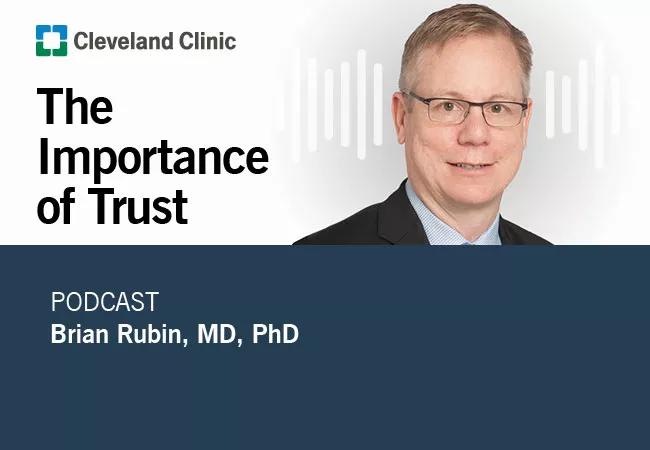Pandemic demanded that leaders trust their teams in a crisis

It took a while for Brian Rubin, MD, PhD, to develop a taste for leadership. Dr. Rubin has been a pathologist for 23 years, and for a long time simply “wanted to practice medicine and science. I think that’s probably typical of a lot of docs.”
Advertisement
Cleveland Clinic is a non-profit academic medical center. Advertising on our site helps support our mission. We do not endorse non-Cleveland Clinic products or services. Policy
But as he tells Brian Bolwell, MD, in the “Beyond Leadership” podcast, about 10 years into his career, Dr. Rubin started to consider a new path.
“I wanted to do things. I wanted to change things,” says Dr. Rubin. “I wanted to impact more lives than just my own.”
He started to take on some leadership roles, including director of soft tissue pathology, fellowship director, and vice chair of research. Eventually, he was appointed Chairman of Pathology and Laboratory Medicine — the role he holds today.
One of the key lessons in his journey, he says, has been learning to have trust in others and rely on their own expertise, as others have done with him.
Dr. Bolwell: Three years ago, COVID hit the United States, and one of the issues that all of us faced in healthcare was how to test for the virus. You got testing for the virus up and running here at the Clinic in a very short period of time. How’d you do that?
Dr. Rubin: I think we saw it coming a little bit earlier than people suspected. The CDC was doing testing early on. We knew they were having problems, so we started to design our own test to get ready. And then when the CDC allowed us to test, we were operational within 48 hours. We were able to design a test and implement it pretty quick. The problem was scaling up.
We were looking at New York City, which was really completely out of control. We didn’t know the extent to which COVID was going to hit Cleveland. Fortunately, we were blessed that it didn’t hit us as hard as it did New York City for whatever reason. But we had to be ready.
Advertisement
I realized very early on that to keep our hospital open, I was going to need to test all of our patients, all the physicians here at Cleveland Clinic. We have 70,000 caregivers at the Clinic. God knows how many patients, but it’s a huge number of patients. And I knew that we’d have to be able to test all of them to keep this place open.
So, we immediately developed a strategy for how we would do that. Now, that strategy ended up getting really big. We started small. It was 200 tests a day, but right away, I knew I needed to get to 10,000 tests per day to get this place open, and I needed to do it in a very short amount of time.
So I got the group together, and we put a business plan together. Thankfully, [Cleveland Clinic CEO & President Tomislav Mihaljevic, MD] is a listener, and he’s also a guy who trusts content leaders. I put together a plan, and even though it was quite expensive, he saw that to keep the hospital open, we had to do what I proposed. He funded it immediately, and we got up to the level we needed to.
Advertisement
Advertisement

Interdisciplinary program fosters high-performance teams

1:1 guidance benefits individuals and organization

Strategies for building connections, staying present

Development leader harnesses shared purpose to fuel meaningful giving

Expert tips from Cleveland Clinic’s Chief Legal Officer

Dedicated leader shares her passion for quality, education and professional development

Groups move the metrics in environmental services and sterile processing

Certified coaches help hospital teams build trust, improve communication